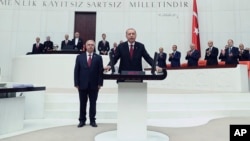Turkish President Recep Tayyip Erdogan has assumed sweeping new powers as the country transitions to an executive presidency.
"I promise to strengthen our nation's unity and fraternity, to develop our country and to elevate our state," Erdogan told parliament Monday after he was sworn in for a new presidential term. Deputies of his ruling AKP cheered, while the opposition sat in silence.
Opponents warn that Turkey is facing an elected dictatorship. Erdogan, however, maintains that his powers are vital to addressing the challenges facing the politically polarized nation.
"We are starting a new model of government," Erdogan said during his inauguration ceremony at the presidential palace. "In the system of the past, there was social, political and economic chaos. From now on, we have a directly elected leader who can be held directly accountable."
Erdogan's new presidential powers are considerable. He can issue decrees with the enforcement of the law and appoint ministers who directly report to him. Erdogan also chooses nine of the 12 constitutional court charges. Under the new system, the post of prime minister is abolished.
"Erdogan is not a dictator but an autocrat, but he was elected," said Huseyin Bagci, professor of international relations at Ankara's Middle East Technical University. "He is a master of Turkish politics. The question is, what can Erdogan change, and what can't Erdogan change?"
Questions over the viability of centralizing power in such a large country of 80 million people are already being raised.
"In general, neither in a nation of Turkey's sophistication nor a big company is it a good idea to centralize power in the 21st century," said political analyst Atilla Yesilada of Global Source Partners. "We have dismantled what's left of the civil service. The powers of municipal powers have been usurped. Devolution is the trend in the world, but we are doing the absolute opposite."
In his inauguration speech, Erdogan reaffirmed his intention of making Turkey one of the world's 10 largest economies.
Observers point out that with Erdogan already exercising power beyond the ceremonial role in his previous term in office through an emergency rule introduced after a failed coup in 2016, the new system could bring welcome clarity.
"It will aid to transparency and introduce some structure to the policy-making process. At this point, policy is made in the corridors of the palace by people we barely know," Yesilada said.
Critics fear Erdogan will use his new powers to step up a crackdown on dissent. In recent days, 18,000 civil servants, along with nearly 200 academics, have been purged from their jobs in an emergency rule decree. Nearly 200,000 people have already lost their jobs since the attempted coup, along with tens of thousands of others jailed on accusations of threatening the state.
Six students were arrested at their graduation ceremony in Ankara on Friday for carrying a giant banner of cartoons caricaturing Erdogan. All face charges of insulting the president.
Some observers suggest Erdogan could use his new powers to heal the deep political divide. Outgoing Prime Minister Binali Yildirim signaled the state of emergency would end upon Erdogan's resumption of power.
"There was the release of a prominent journalist, and there will be more releases in the future. The state of emergency was one of the most criticized issues," Bagci said. He was referring to well-known journalist Mehmet Altan, who was freed from prison last week. Altan is a high-profile Erdogan critic.
Easing up on the crackdown on dissent could help Erdogan in the immediate twin challenges facing his presidency: fears of a looming economic crisis and strained diplomatic ties with his Western allies. Relations have soured in part over human rights concerns.
Hungarian Prime Minister Viktor Orban was the only European Union leader in attendance at the ceremony, in a sign of coolness between Erdogan and the bloc. Turkey has been seeking to join the EU but cannot do so unless certain criteria required for membership have been met. Orban was one of 22 heads of state at the inauguration. Most came from Arab and African countries. Venezuelan President Nicolas Maduro, a close Erdogan ally, was present.
Observers point out that improving ties with the West could be crucial if Ankara is forced to look to the West for help in the event of a financial crisis. Financial markets are increasingly alarmed over Turkey's massive debt, fears that have already resulted in heavy falls in the value of the currency.




